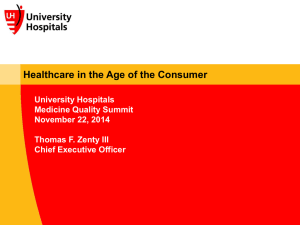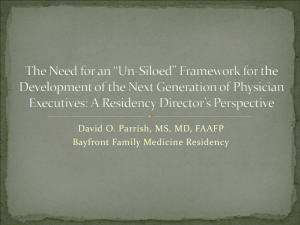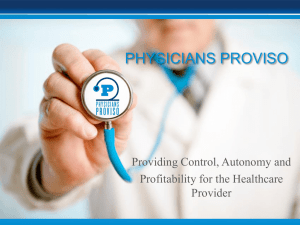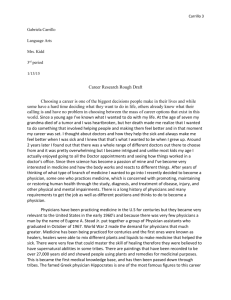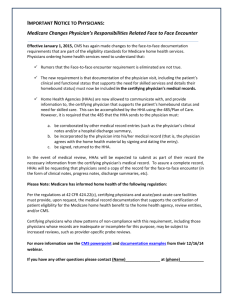Family Medical Group – Communication Policies
advertisement
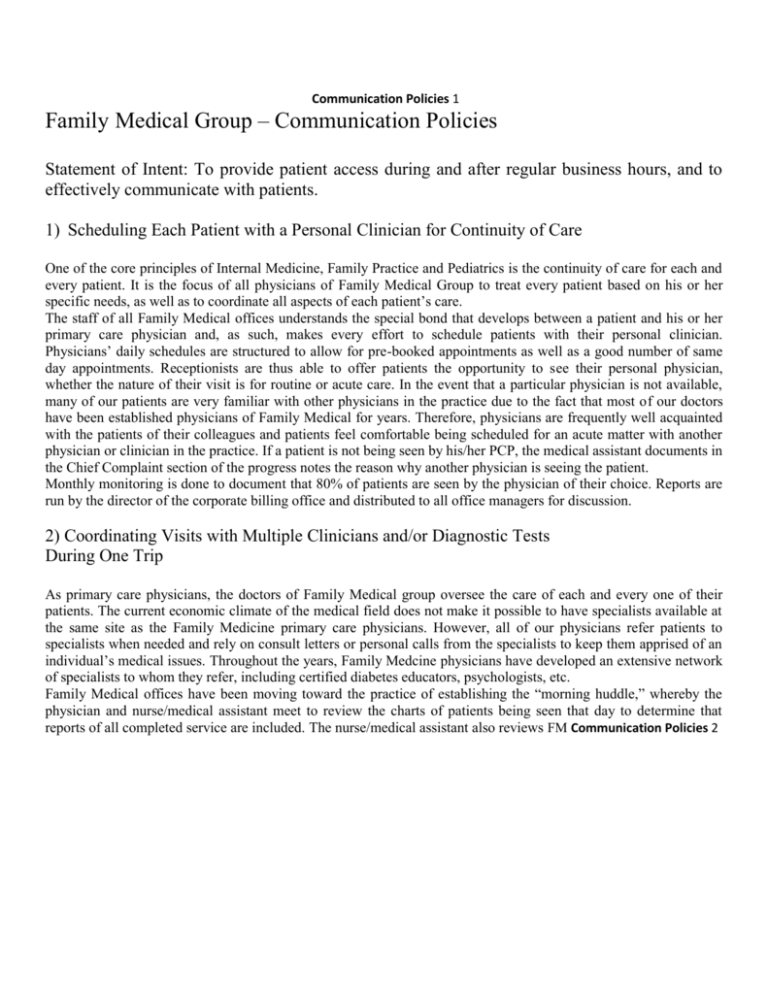
Communication Policies 1 Family Medical Group – Communication Policies Statement of Intent: To provide patient access during and after regular business hours, and to effectively communicate with patients. 1) Scheduling Each Patient with a Personal Clinician for Continuity of Care One of the core principles of Internal Medicine, Family Practice and Pediatrics is the continuity of care for each and every patient. It is the focus of all physicians of Family Medical Group to treat every patient based on his or her specific needs, as well as to coordinate all aspects of each patient’s care. The staff of all Family Medical offices understands the special bond that develops between a patient and his or her primary care physician and, as such, makes every effort to schedule patients with their personal clinician. Physicians’ daily schedules are structured to allow for pre-booked appointments as well as a good number of same day appointments. Receptionists are thus able to offer patients the opportunity to see their personal physician, whether the nature of their visit is for routine or acute care. In the event that a particular physician is not available, many of our patients are very familiar with other physicians in the practice due to the fact that most of our doctors have been established physicians of Family Medical for years. Therefore, physicians are frequently well acquainted with the patients of their colleagues and patients feel comfortable being scheduled for an acute matter with another physician or clinician in the practice. If a patient is not being seen by his/her PCP, the medical assistant documents in the Chief Complaint section of the progress notes the reason why another physician is seeing the patient. Monthly monitoring is done to document that 80% of patients are seen by the physician of their choice. Reports are run by the director of the corporate billing office and distributed to all office managers for discussion. 2) Coordinating Visits with Multiple Clinicians and/or Diagnostic Tests During One Trip As primary care physicians, the doctors of Family Medical group oversee the care of each and every one of their patients. The current economic climate of the medical field does not make it possible to have specialists available at the same site as the Family Medicine primary care physicians. However, all of our physicians refer patients to specialists when needed and rely on consult letters or personal calls from the specialists to keep them apprised of an individual’s medical issues. Throughout the years, Family Medcine physicians have developed an extensive network of specialists to whom they refer, including certified diabetes educators, psychologists, etc. Family Medical offices have been moving toward the practice of establishing the “morning huddle,” whereby the physician and nurse/medical assistant meet to review the charts of patients being seen that day to determine that reports of all completed service are included. The nurse/medical assistant also reviews FM Communication Policies 2 with the patient why he/she is in the office and discusses any related services that the patient is seeking during the course of the visit. There are a limited number of diagnostic tests that may be performed in a primary care setting. However, based on the nature of their office, Family Medical physicians do perform throat cultures, pregnancy tests, EKG’s, urinalysis, PAP smears, and DEXA scans. All routine vaccinations are also administered in-office. Patients are referred to specialists or other facilities when diagnostic tests outside the realm of the primary care office are warranted. Quarterly monitoring of one-fourth of the offices is done to document that coordination of care is provided 80% of the time. The Assessment of Visit Coordination Log is used by medical assistants prior to and at the time of the patient visit. 3) Determining Through Triage How Soon a Patient Needs to be Seen Because the schedules of all Family Medical physicians contain a good number of same day appointments, most patients who call seeking an appointment are able to be scheduled by the front desk staff. However, all Family Medical offices also have in place a particular method of triage that is unique to that office, depending upon the number of physicians in a given office. OtherTown Family Practice and Otreville Primary Care, for example, both have a full-time nurse whose job function is to triage calls from patients at both of its locations. She determines how quickly a patient needs to be seen and works very closely with the front desk staff of both offices to make certain that the patient is seen on an as-needed basis by his or her personal physician or, when not possible, by another physician in the practice. Should there be extenuating circumstances, the triage nurse also works closely with the physicians of both offices and will consult with them when communicating with a patient. Same day appointments are scheduled based on the triage protocols established by the office. Urgent and emergent appointments are given priority. Urgent appointments are those determined by the triage nurse to require medical evaluation within 2 hours. Emergent appointments are those determined by the triage nurse to require medical evaluation within 1 hour. Spot checks are performed quarterly at one-fourth of the offices to document that this policy is met 80% of the time. Each office determines who completes the Phone Triage Compliance Log and performs the spot checks, as well as how this information is distributed. For example, the larger offices use their monthly office meetings as a forum to discuss the results. 4) Maintaining the Capacity to Schedule Patients the Same Day They Call All physicians’ schedules contain a certain number of same day appointments to accommodate those patients who have acute or urgent matters that need more immediate attention. Depending on the office, same day appointments are either interspersed among others in the physician’s schedule or placed at the end of the day. The same criteria apply whether the appointment request is from the patient, family member, or someone else calling on the patient’s behalf. Great care is given when determining the necessary number of same days in a physician’s schedule on any given day. Mondays, for example, Communication Policies 3 traditionally warrant a large number of same day appointments. Other factors that are taken into consideration are whether any other physicians in the practice are off, whether it is flu or allergy season, or even if it is the week before school when parents realize they failed to have their children obtain the required sports’ physicals. Quarterly monitoring is performed at one-fourth of the offices. Each office determines who completes the Business Hours Log and conducts the spot checks. The office managers review the respective logs to insure compliance that requestors receive same day appointments 80% of the time. 5) Scheduling Same Day Appointments Based on Practice’s Triage of Patients’ Conditions As mentioned above, every effort is made to keep an adequate number of same day appointments available for every Family Medical physician. Likewise, each Family Medical office has its unique procedure for dealing with triage calls and insuring that each patient is seen on a timely basis for his or her medical issue. For example, AcrossTown Family Practice receptionists notify the triage nurse when there is a patient who needs to speak with her and then transfer the patient to her extension. The triage nurse then assesses the patient’s situation and determines if and when that patient needs to be seen. She will then go directly to a receptionist and have her schedule the patient as needed. Quarterly monitoring is done in one-fourth of the offices to document that this policy is met 80% of the time. Each office determines who completes the Phone Triage Compliance Log and performs the spot checks, as well as how this information is distributed. For example, the larger offices use their monthly office meetings as a forum to discuss the results. 6) Scheduling Same Day Appointments Based on Patient’s/Family’s Request The staff of each Family Medical office realizes that patients often find it difficult to incorporate a visit to their physician in their busy daily lives, be it a routine physical or a more urgent matter. Therefore, they take great care to be sensitive to the time restrictions of the patients and to do their best in offering patients several options for scheduling their appointments. Likewise, the physicians of Family Medical also realize the difficulty many patients face in seeking the care they need while simultaneously meeting the demands of their place of employment or their families. Responding to the needs of patients, many of the Paramount offices offer extended hours. For example, AcrossTown Family Practice offers morning appointments as early as 7:30 am on a daily basis. The office also schedules patients until 7:30 pm each evening and offers Saturday morning urgent care appointments as well. Patients are therefore given the opportunity to come in for a same day appointment during the time frame that best suits their schedule for the day. Quarterly monitoring is done in one-fourth of the offices. Each office determines who completes the Business Hours Log and conducts the spot checks. The office managers review the respective logs to insure compliance that requestors receive same day appointments 80% of the time. Communication Policies 4 7) Providing Telephone Advice on Clinical Issues During Office Hours by Physician, Nurse or Other Clinician within a Specified Time Great care is placed on providing telephone advice on a clinical issue to a patient on a timely basis. Physician schedules, for example, are structured to allow callback time at different intervals during the day. This allows the physicians to touch base with patients who have immediate concerns, as opposed to having to wait for a call back until all patients are seen. Physicians also spend a great deal of time after seeing patients each day returning patients’ calls and addressing their medical questions and concerns. In addition, the presence of a triage nurse who works closely with the physicians is a tremendous asset in providing telephone advice throughout the day to patients seeking answers to their questions. Clinical staff will return non-urgent calls to patients for clinical advice and other requests within 6 hours of the call. Quarterly monitoring is performed in one-fourth of the offices. Each office determines who completes the Business Hours Log and does the spot checks. The office managers review the respective logs to insure compliance that this policy is met 80% of the time. 8) Providing Urgent Phone Response within a Specific Time, with Clinician Support Available 24 Hours a Day, 7 Days a Week Urgent telephone calls are handled on an immediate basis. During office hours urgent calls are returned by a clinician within 30 minutes. Each Family Medical office has in place its system for maintaining coverage 24 hours a day, 7 days a week. While the Pediatric offices use a private pediatric urgent care answering service between 6:00 pm and midnight, and a triage nurse from the urgent care center from midnight until 6:00 am, the Internal Medicine and Family Practice offices are supported by our answering service. This automated answering service brings database precision and reliability to physician on-call management based on the precise needs and protocols of a given physician, eliminating the need for operator interpretation. For those offices using the answering service, the on-call physician may set his or her preferences for contact during specific time periods while he is on call – be it by beeper, cell phone or home phone. All of the physicians can tailor their own on-call contact arrangements to fit their needs and desires. Should a physician not access a call within 20 minutes, he or she is automatically contacted again. Unaccessed calls then follow a specific protocol set in place by each office until contact is made with a clinician who can follow-up on the call. This guarantees that no call is lost and patients can expect a response to their urgent phone calls at all times. Quarterly monitoring is performed in one-fourth of the offices. Each office determines who completes the Business Hours Log and does the spot checks. The office managers review the respective logs to insure compliance that this policy is me 80% of the time. Communication Policies 5 9) Providing Secure E-Mail Consultations with Physician or Other Clinician on Clinical Issues, Answering within a Specified Time Our electronic medical system has the capability to have a patient portal, offering physicians and patients secure email communication that is saved in a patient’s record, as well as providing patients the opportunity to access certain pieces of their medical records. It is the eventual goal of all Family Medical offices to utilize the patient portal and all it has to offer. At the moment, Family Medical has its own secure server and each physician has a HIPAA compliant e-mail address that facilitates communication with patients. Physicians are able to handle patient refills and referrals on-line, as well as correspond with patients regarding test results, questions and concerns. These e-mails may then be cut and pasted into the patient’s medical record. This method allows physicians to communicate with their patients at any given time of the day and, as such, can facilitate response time. Appropriate staff will respond to secure e-mails within 1 day for clinical messages and 3 days for non-clinical ones. Physicians may also post a message that indicates if they are away for a given period of time, so that patients can be made aware when they can expect a response from their physician. Screen shots are reviewed quarterly in one-fourth of the offices to document this policy is met 80% of the time. 10) Providing an Interactive Practice Web Site Family Medical Group does have a Web site, which can be accessed by going to www.Familymedicalgroup.com. The Web site details the different medical offices that comprise Paramount Medical Group, and provides photos and short biographies of each of its affiliated physicians. Contact information is available for each of the offices, as well as forms for new patients to complete prior to an initial visit. (At this time the Web site is not interactive.) Because the site is not interactive, computerized reports are not available. However, screen shots are available and may be reviewed to document the Web Site. 11) Making Language Services Available for Patients with Limited English Proficiency The great majority of patients serviced by Family Medical offices speak English, and thus the need for language services is not applicable in almost all cases. In addition, there are several physicians and staff members who do speak other languages fluently. For example, AcrossTown Family Practice has a physician who speaks Spanish, as well as one who is fluent in Mandarin Chinese. Patients who may have trouble communicating in English most often bring a family member to help them communicate with their physician. We have also identified two telephone-based translation services available should the need arise. The communication preference of established patients is noted in the patient record. The office manager ensures that the appropriate communication services are provided for each patient and that this is documented in the patient record. Communication Policies 6 Quarterly monitoring of one-fourth of the offices is performed to document that this policy is followed 80% of the time. The Assessment of Visit Coordination Log is used by medical assistants prior to and at the time of the patient visit. 12) Identify Health Insurance Resources for Patients/Families without Insurance The majority of patients seen by the Family Medical physicians do have health insurance. Those who do not and are unable to afford medical care are directed to contact different resources available to them. For example, the State Commissioner of NC offers the uninsured the opportunity to purchase medical insurance through a pool. NC State Family Care, Medicaid, or the Social Service Department of area hospitals are also offered to patients as resources, as well as some internet-based sites. Patients are referred to the Family Medical web site to access all resources. Documentation of the referral is made in the patient chart at that time. Pediatric patients without healthcare who are in need of immunizations are directed to their local Health Department. Records are maintained in the charts of patients with no insurance documenting the resources for medical care to which they were made aware. Practice management system reports are used to spot-check that this information is provided to patients 80% of the time. Patient Feedback A Patient Feedback Form is available on the Family Medical web site. It may be completed and submitted on-line. This feedback is monitored by the administrative assistant at the corporate office and distributed to the office managers for appropriate action. The effective date of this Policy Manual is April 8, 2009 and will be reviewed quarterly. Staff members are notified of revisions to this Manual by the office manager of each office. This information is communicated to patients by referral to the Family Medical Web Site. A notice informing patients that this information is available is also posted in the waiting room of each office.
